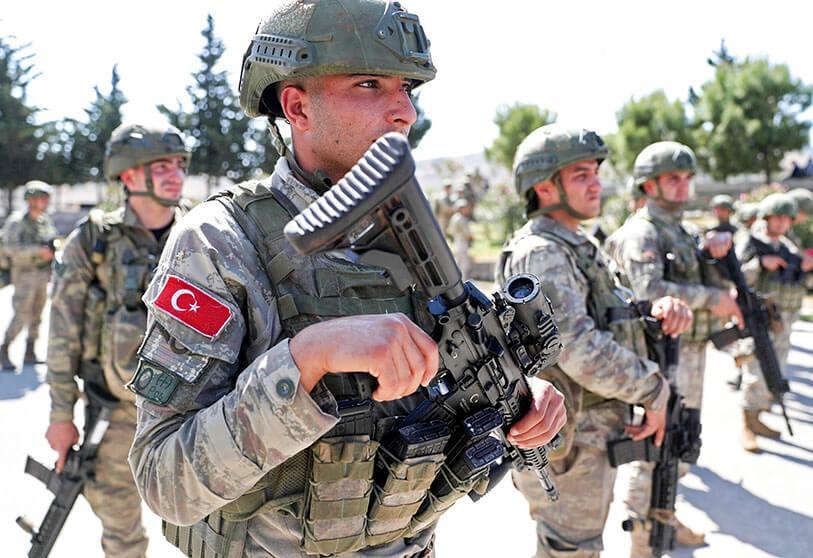Turkish-backed militias fighting the Assad regime in Syria are committing war crimes against Kurdish civilians, including rape and torture, the UN has said.
The Commission of Inquiry on Syria said it has “reasonable grounds to believe” that forces funded and trained by Ankara have committed pillage, hostage-taking, rape and torture, possibly with the knowledge of Turkish forces present in the area.
Russia, along with Iran, supports President Assad’s forces while Turkey backs some of the rebel groups which have been trying to oust him in a complex civil war that has dragged on for more than nine years. Turkish forces seized control of the border town of Ras al-Ain last year in an effort to push back Syrian Kurdish YPG fighters, which Ankara views as a terrorist group.
Some civilians, including women, were taken to Turkey to stand trial for crimes that they were accused of committing in Syria, a commission report said. This provided “further indication of collaboration and joint operations between Turkey and the Syrian National Army for the purpose of detention and intelligence-gathering,” it said.
The militias, collectively known as the Syrian National Army (SNA) since December 2017, number some 90,000 troops and are comprised of fighters committed to bringing down the Assad regime and others who have been recruited from the Syrian diaspora in Turkey. Some of those groups were funded and armed by the US in the early stages of the Syrian civil war, but then co-opted by Turkey when the Pentagon turned its support to Kurdish forces in the fight against Islamic State.
Other SNA groups are made up of ethnic Turkmen who live in northern Syria but speak Turkish as a mother tongue. One of these, the Sultan Murad Brigade, is accused of looting civilian homes in the Afrin region, which was taken by Turkish-backed forces in early 2018, and then trying to sell the properties back to the owners. They are also accused of involvement in the abduction and forced marriage of a Kurdish woman in Afrin and Ras al-Ain.
The authors of the UN report accuse the Hamza Brigade, which comprises mainly Sunni Arab Syrians, of organised looting, including appropriating the home of a Kurdish family which was later converted into a Koranic school by the IHH, a Turkey-based charity. Members of the brigade are also alleged to have tried to force detained women belonging to the polytheistic Yazidi sect to convert to Islam.
The report was based on 538 interviews, as well as documents, satellite imagery and other evidence. It covers the first half of 2020, at a time when a ceasefire between rebels and the government and its allies has largely been observed in the rebel-held Idlib region.
The commission has called on Turkey to ensure public safety in the areas of northern Syria that it now controls, and to afford special protection to women and children. “Sadly, the suffering of the Syrian people does not rest with the government of Syria only,” said Paulo Pinheiro, the chairman.
Hanny Megally, a member of the commission, said Turkey has a “lot of influence” over the rebels. “Whilst we can’t say Turkey is in charge of them and issues orders and has command control over them, we think that it could use its influence much more to bring them into check, and certainly to pressure them to desist from the violations being committed, and to investigate them.”
A senior Turkish official told The Times that Ankara “categorically rejects this outrageous claim”. He added: “Turkey has been operating transparently and legally in areas previously controlled by terrorist groups, including PKK and Isis.”
Ankara has used affiliated Syrian rebels in all three of its cross-border offensives in Syria in the past four years, and has formalised and expanded its support for them over time. SNA troops are now funded and trained by Turkey, and operate in areas where Ankara has also taken over local governance.
Turkey’s stated aim is to push Kurdish forces back from all areas along its 500-mile border with Syria, and in doing so create a buffer zone in which some of the 3.6 million Syrian refugees it says it is playing host to can be settled.
The first Turkish offensive, launched in August 2016, drove Isis fighters back from the last patch of occupied territory along its border, severing the route by which tens of thousands of foreign jihadists had travelled into Syria, drawn by the promise of a militant caliphate. Within weeks, however, the advance had brought Ankara’s forces into direct conflict with the YPG, the Kurdish militia which has been the West’s main partner in Syria.
The second and third offensives, in January 2018 and October 2019, were launched specifically against the YPG. Turkey says that the group is one and the same as the Kurdistan Workers’ Party, or PKK, a militia which has been fighting for independence in eastern Turkey since the 1980s, and is listed as a terrorist group by the UK, US and EU.
The two militias share a leftist ideology and pledge loyalty to the same leader, Abdullah Ocalan, who has been imprisoned in Turkey since 1999. Many YPG fighters and leaders cut their teeth as PKK guerrillas, and Ankara claims that they have been shifting weapons from Syria across the border into Turkey to use in their insurgency there.
A peace process between Ankara and the PKK broke down in July 2015, and more than 5,000 people have been killed in fighting in eastern Turkey since then.
The alleged abuses by Turkish-backed forces have contributed to the overall decline in security across the country, despite a reduction in large-scale fighting since the start of this year. Civilians are also being arbitrarily arrested in Kurdish and regime- controlled regions, and in the latter have in some cases been held and tortured for more than seven years, the commission said.

